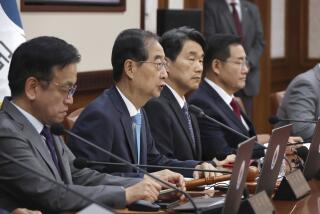Talks between North, South Korea collapse
- Share via
Reporting from Seoul — North Korean negotiators walked out Wednesday on the second day of talks with their South Korean counterparts, renewing doubts that the two sides can ease deep tensions that linger following two deadly attacks attributed to the North last year.
The preliminary talks between two military colonels at the border village of Panmunjom — the first between the two sides in four months — had been intended to set a date for higher-level military talks. But the discussions collapsed Wednesday afternoon, leaving Seoul officials chagrined.
“The talks failed to narrow differences over the agenda for a high-level meeting,” said Kim Min-seok, a spokesman for Seoul’s defense ministry. He added that the two sides even failed to set a date for future preliminary talks.
Kim said North Korea’s representatives “unilaterally walked out of a meeting room.”
South Korean officials said the two sides remained far apart on a host of issues. The previous day saw an ominous start to the talks, with the two sides haggling over the agenda and other key terms of higher-level talks, officials said.
North Korea also refused to take responsibility for the March sinking of torpedo attack on a South Korean warship that killed 46 crewmen. Pyongyang has denied any involvement in the sinking, but a report by a commission of international experts concluded that a North Korea submarine fired a torpedo at the Cheonan.
Pyongyang has also claimed that its artillery shelling of South Korea’s Yeonpyeong Island in November, which killed four people, was justified because Seoul had provoked it with what officials called live-fire drills into North Korean waters.
The United States, meanwhile, has insisted that North Korea must admit its role in the killing of the South Korean sailors before Washington and its allies will return to the so-called six-party talks aimed at ending the North’s nuclear weapons program.
The talks, which involve the two Koreas, the United States, China, Japan and Russia, ended in 2009 when North Korea walked away in protest of U.N. and international sanctions imposed over its nuclear and missile tests.
Analysts say the collapse of talks Wednesday does not bode well for the region. South Korean President Lee Myung-bak has hinted that he is growing wary of the North’s strategy in recent years of stirring up tension between the two sides only to later return to the bargaining table as a way to secure food and financial aid for the struggling regime.
“Both official and public opinion in South Korea seem to be moving toward a position of ‘enough is enough.’ Pyongyang’s tried-and-true strategy of increasing military tension on the peninsula as a means of extracting economic aid from the South, and then agreeing to talks to reduce the tension, may have run its course,” said William Keylor, an international relations professor at Boston University.
North Korea set its own agenda for this week’s talks. Officials complained about Seoul sending propaganda leaflets into the North denouncing Kim Jong Il’s regime. Pyongyang also demanded that the two sides discuss measures to halt future provocative military acts as the main agenda for the higher-level meetings.
Wednesday’s talks began on a positive note with both sides agreeing to hold discussions on reuniting families separated by the war that ended in a stalemate in 1953.
“The government has sufficiently shared the view on the urgency and importance of humanitarian issues, including the reunions of separated families,” said Lee Jong-joo, a spokesman for South Korea’s Unification Ministry.
Then hours later, the North’s negotiation team stormed out of the meeting room, leaving concerns unaddressed.
More to Read
Sign up for Essential California
The most important California stories and recommendations in your inbox every morning.
You may occasionally receive promotional content from the Los Angeles Times.














